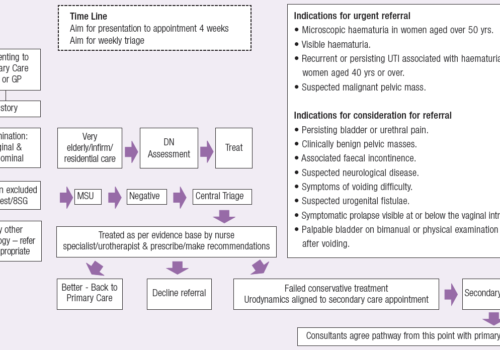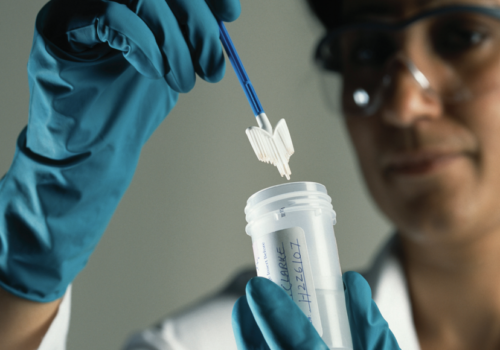All too many women with urinary incontinence are referred to secondary care when they could be assessed and successfully treated by their GP, practice nurse or local primary care continence advisor. This article explains how one PCT introduced a local pathway that has changed professional behaviour, and proved popular with both professionals and patients.
Preventing unplanned pregnancy: no lottery with LARCs
Despite NICE guidelines, long-acting reversible contraceptives (LARCs) remain little used in the UK, but this looks set to change with their inclusion in this year’s new Quality and Outcomes Framework contraception indicators. The author reviews the currently available LARCs, and discusses how to tailor choice to the needs and preferences of each woman.
Nurses lead the way: achieving new QOF contraceptive targets
In order to comply with NICE guidance and achieve new QOF indicators, general practices must offer women a choice of contraception, including long-acting reversible methods. But practices may struggle if GPs have not maintained their competencies in fitting these devices. The author explains how nurse-led clinics can both enhance services for women and help practices achieve targets.
Improving bowel control: the primary care approach
A woman with faecal incontinence may have suffered for years before she finds the courage to ask for help. Such consultations can be a challenge for both patient and professional. But sensitive, careful assessment and simple, conservative measures will often improve bowel control and restore the patient’s quality of life
Fit a vaginal pessary for pelvic organ prolapse
Pelvic organ prolapse is common, affecting about one third of women during their lives. Most women are asymptomatic, but prolapse can be serious enough to need referral for surgery. The good news is that vaginal ring pessaries can improve prolapse symptoms and restore quality of life for most women seeking help from their GP or practice nurse.
Emergency contraception: the right choice at the right time
Until recently, there were two options for emergency contraception after unprotected sex or contraceptive failure: an oral progestogen-only tablet, and the copper-containing intrauterine device. These have now been joined by a new oral method, and this article reviews the three options in light of changing guidance on emergency contraception.
Editorial
For anyone working in the NHS, it has been a tumultuous few months. We were all gearing up to the establishment of GP consortia by 2013. Now the pace of change has slowed following the Government’s acceptance of the NHS Future Forum’s recommendations. This gives us all time to pause and remember that meeting the needs of our patients should be our first priority, and that this depends critically on the knowledge and skills of all NHS professionals.
Dealing with sexual assault in primary care
Sexual assault is common. All sections of society are affected, and victims may be men, women or children. Patients attending primary care may have no intention of reporting their assault to the police. But a trusted GP or practice nurse can ensure that victims receive appropriate specialist care through local Sexual Assault Referral Centres (SARCs).
Cervical screening: time for HPV testing
The NHS Cervical Screening Programme is universally lauded as a success story, preventing an estimated 2,000 deaths a year from cervical cancer in the UK. The programme continues to be refined in light of new evidence, and the latest development is the introduction of human papilloma virus (HPV) testing alongside cytology.
Viewpoint
In our Contraception and Sexual Health service, we continue to receive a small but steady stream of GP referrals requesting a change of intrauterine device (IUCD) or intrauterine system (IUS) for women with actinomyces-like organisms (ALOs) on their cervical smear report. All of the women have been asymptomatic and happy with their IUCD/IUS. It is time that we cleared up continuing confusion about the implications of colonisation with ALOs to protect women from unnecessary and potentially harmful changes of contraceptive device.
The 60-year-old woman who is unwilling to stop HRT
While many women are anxious about starting hormone replacement therapy (HRT), practitioners who regularly see and advise women about menopause increasingly have to address the issue of when to stop HRT. Is there a time when HRT suddenly becomes dangerous? If so, at what age? 58? 60? 70? And what about the woman who is adamant she does not want to stop?
Sponsored Feature: Heralding the ultimate cholesterol lowering plan (UCLP) – the renaissance of dietary management of raised cholesterol
Coronary heart disease (CHD) affects over 2.8 million people and is the main cause of death in the UK.1,2 CHD is also economically damaging, imposing a huge annual burden, with healthcare costs estimated to be around £3.3 billion.2 Two-thirds of the population could reduce their risk significantly by lowering their cholesterol levels – the main modifiable risk factor. The Ultimate Cholesterol Lowering Plan (UCLP) is a revolutionary approach that provides the nation with a truly realistic and achievable dietary plan that can significantly reduce the current CHD epidemic.
View full PDF article (open in new window























